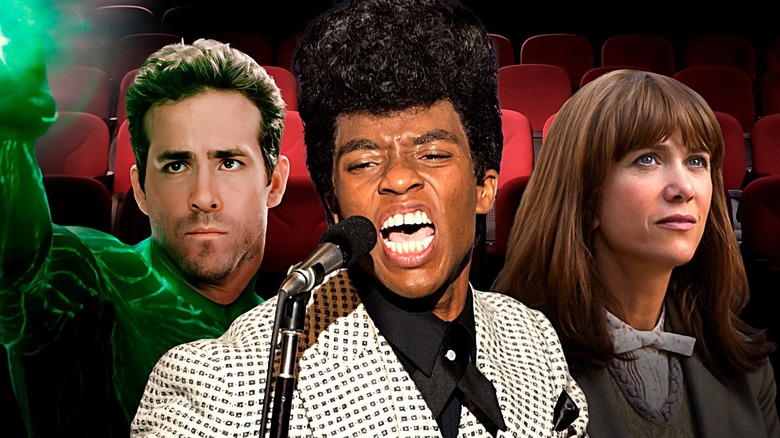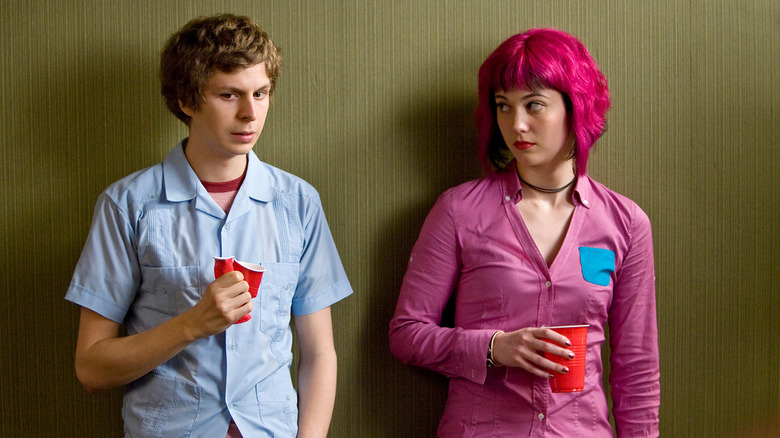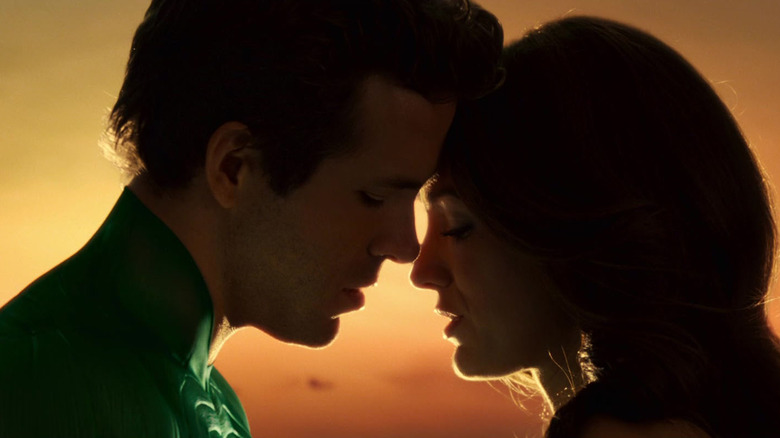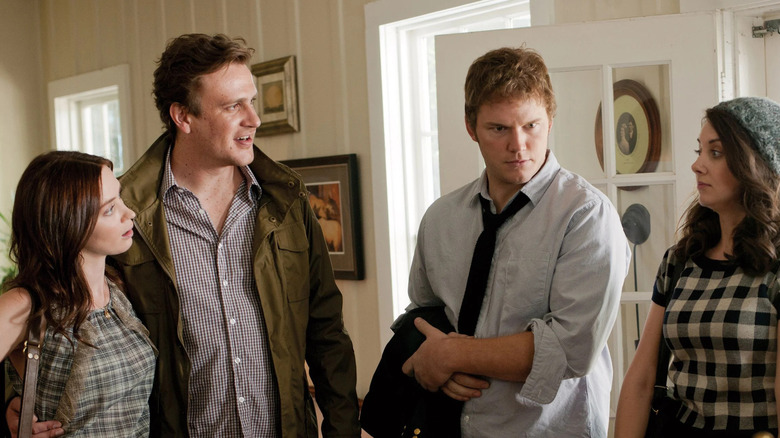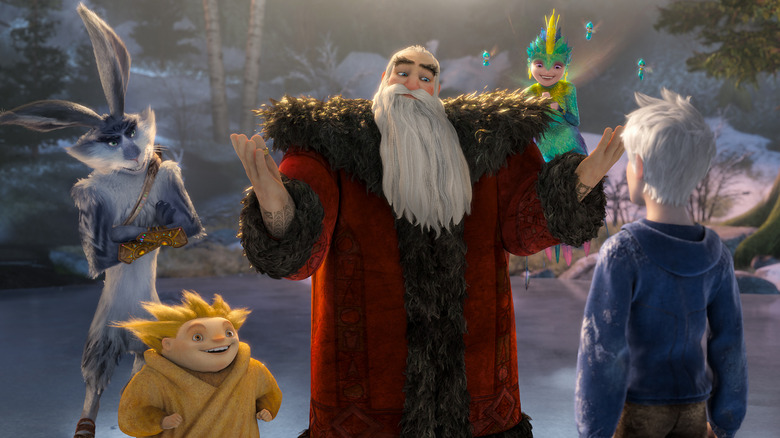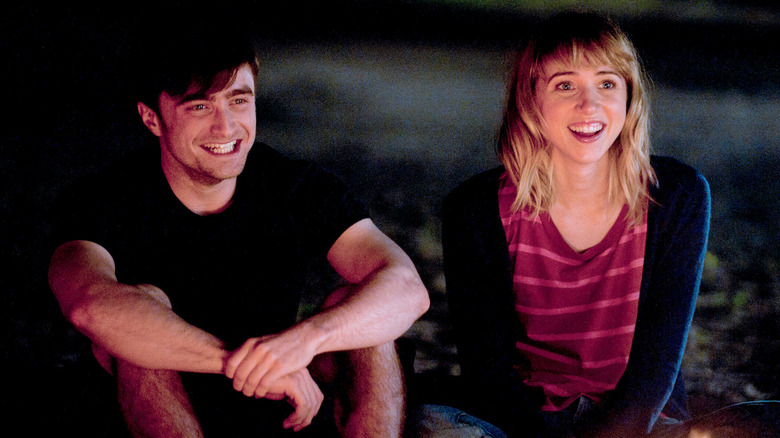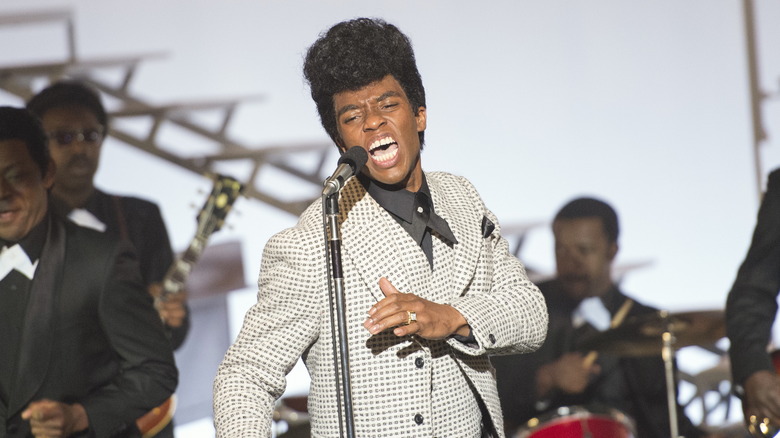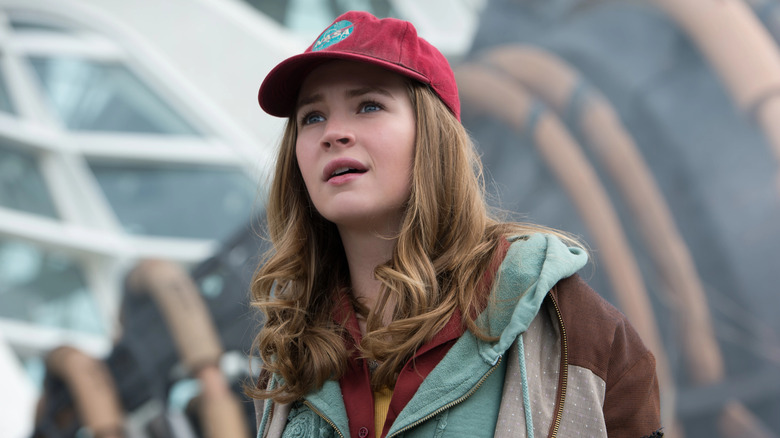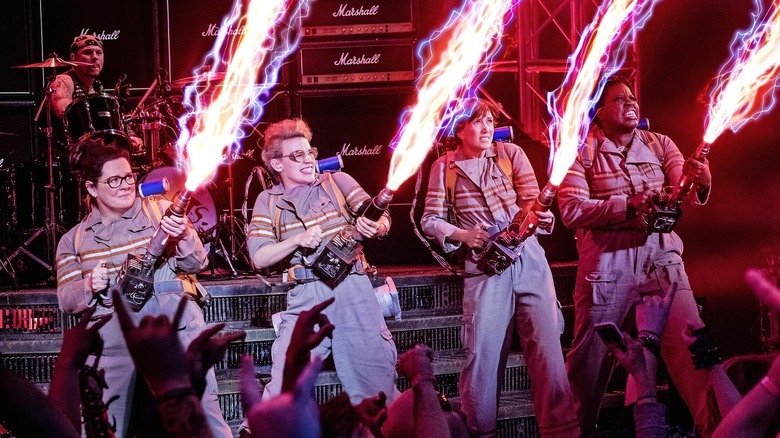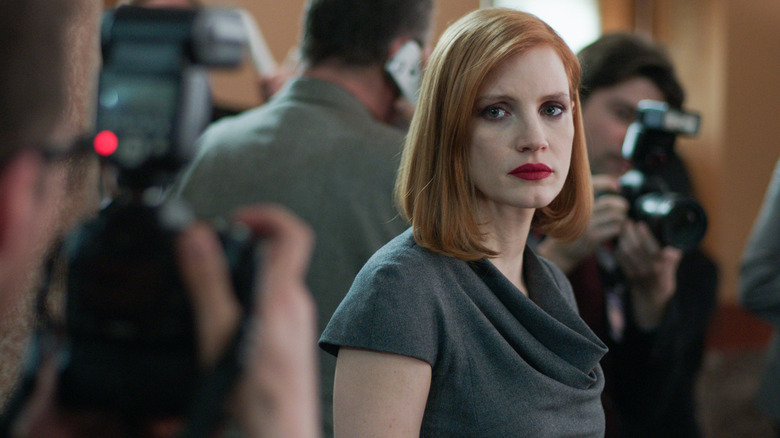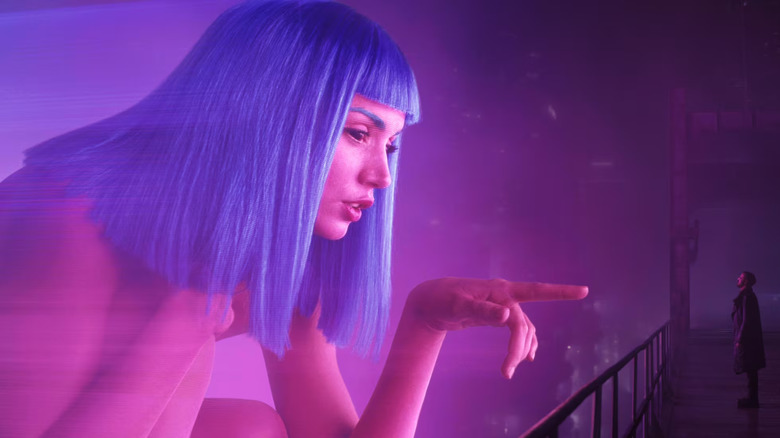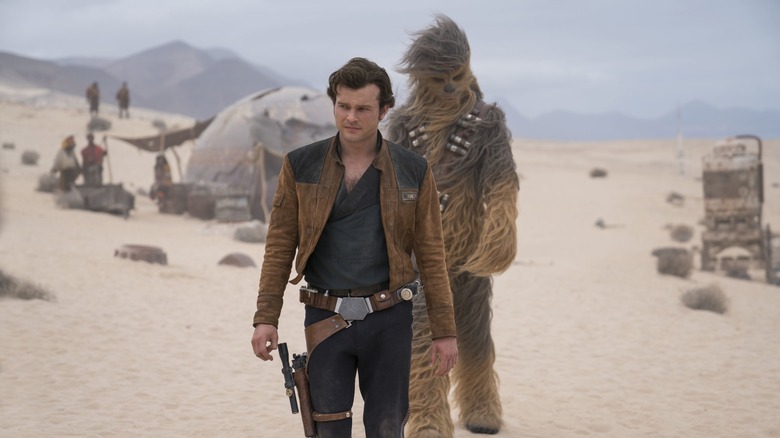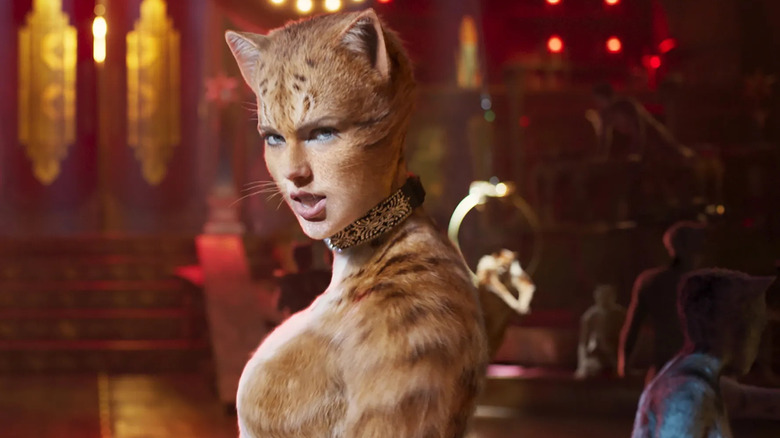Box Office Bombs From The 2010s That Are Actually Worth Watching
The 2010s represent a culmination of changes in the film industry, in terms of what types of movies were successful at the box office. As recently as the 1990s, box office hits included auteur classics like "Goodfellas" and "Fight Club, but at the turn of the millennium, audiences began to almost exclusively towards movies with huge spectacle, from the crowd-pleasing action of "Gladiator" in 2000 to the CGI revolution of 2009's "Avatar." Although there were plenty of modest biopics and dramas released throughout the 2010s, most of the decade's highest-grossing films were reliable heavy-hitters including Marvel Cinematic Universe epics, Disney animation, and installments of the "Fast and Furious" franchise.
While the films on this list may not have made the biggest impact on the box office in the 2010s, they still deserve the attention of audiences. Some weren't as deserving of the commercial failure as audiences may have thought at the time, while others understandably bombed but still might make excellent choices for movie nights. If you're one of many audience members who opted not to see any of these movies in theaters, perhaps consider giving them a second chance.
Scott Pilgrim vs. the World
In 2023, it's quite hard to fathom that "Scott Pilgrim vs. the World" wasn't the huge success that it is now. Released in 2010, the Edgar Wright film was based on a series of graphic novels and featured an all-star cast including Michael Cera, Mary Elizabeth Winstead, Brie Larson, and Chris Evans. Cera plays Scott Pilgrim, a young rock band member who begins dating the elusive Ramona Flowers, played by Winstead, while also facing the fury of her seven evil exes.
Sadly, moviegoing audiences didn't pay much attention to "Scott Pilgrim" at the time, and it failed to recoup its $60 million budget during its original theatrical run. Edgar Wright wasn't too hurt by the film's failure, as he was reassured by Michael Moses, head of marketing at Universal Pictures, that it would eventually find its audience. He shared in an interview with Collider, "It was just one of the best emails about anything in my career I've ever received. Michael Moses sent an email and all it said was, 'Years, not days.'"
The film is now widely considered a cult classic, featuring iconic roles for each of its cast members. Those actors have remained loyal to "Scott Pilgrim" — every one of them agreed to return to their roles via voiceover for Netflix's "Scott Pilgrim Takes Off," an animated series that takes a slightly different approach to the original story.
Green Lantern
DC Studios has often struggled to capture Marvel's magic in their attempts to adapt their comic book IP. One of the more infamous examples of this was 2011's "Green Lantern," starring Ryan Reynolds as a human-turned-space-cop tasked with defending Earth from a rival alien force. It was subject to harsh criticism upon release, with The New York Times calling it "bad ... despite Mr. Reynolds's dazzling dentistry, hard-body physique and earnest efforts." The film's box office performance reflected this criticism, just barely breaking even on its $200 million budget.
Few have been as personally critical of the film as Reynolds himself. Although its production introduced him to his now-wife, Blake Lively, who stars as Hal Jordan's love interest, Reynolds has often publicly mocked the film, even during his later superhero adventures as Deadpool for Marvel. However, Reynolds didn't watch the film in its entirety until 2021, when he live-tweeted his first viewing of it as part of a sponsorship with his distillery, Aviation Gin.
Despite Reynolds' public lampooning of the film, he was pleasantly surprised by his first watch, tweeting that the film "was nothing to fear! Hundreds of incredible crew and cast members did amazing work — and while it's not perfect, it ain't a tragedy." This sentiment has been echoed by many online, as well as some rare positive reviews when it first was released, which perhaps indicates that those who dismissed "Green Lantern" the first time around owe it a rewatch.
The Five-Year Engagement
In the 2000s, Judd Apatow-produced comedies were not only plentiful, but very commercially successful. Some highlights of the decade included box office hits like "Knocked Up," "Pineapple Express," and "Forgetting Sarah Marshall." Even the 2010s saw several box office successes in "This is 40" and "Trainwreck." However, the 2010s also saw some slight disappointments, including 2012's "The Five-Year Engagement," starring Jason Segel and Emily Blunt as a couple whose wedding is continuously postponed for — you guessed it — five years.
Sadly, "The Five-Year Engagement" was a major disappointment by rom-com standards, failing to top that weekend's "Think Like A Man," or "The Hunger Games" in its sixth week of theatrical showing. The film's domestic numbers didn't break even against its $30 million budget, though thankfully it grossed a total of $54 million when combined with its international box office results. Still, compared to the previous year's "Bridesmaids," it was a rough turnout for this Apatow-produced flick.
However, the film's reviews suggest that it was a diamond in the rough after all. Entertainment Weekly called it "an enjoyable grab bag of messy life circumstances," while The New York Times commended the performances of its two leads, and the chemistry between them, despite its romantic-comedy cliches. It's well worth the viewing, especially to see early supporting roles for future stars Chris Pratt and Alison Brie.
Rise of the Guardians
DreamWorks Animation entered the 2010s after a successful decade of producing some of the highest-grossing animated films of all time: "Shrek" trilogy, "Kung Fu Panda," and "Shark Tale." It wasn't until 2012 that the studio hit its first snag. "Rise of the Guardians" showed potential as a new franchise, assembling a ragtag team of imaginary childhood figures, including Santa Claus, the Tooth Fairy, and the Easter Bunny.
The critical response to "Rise of the Guardians" should've seen it join the ranks of DreamWorks Animation's biggest hits of the decade, with Empire writing of the film, "It's gorgeously designed, deftly written and frequently laugh-out-loud funny." By 2023, it's obvious that hasn't come to pass after the high expectations for the film's performance not only underwhelmed, but even had disastrous effects on DreamWorks as a studio.
With a box office performance of over $300 million against a budget of $145 million, The Guardian documented the studio's overall losses as over $80 million, resulting in budget cuts and layoffs, while reporting that CEO Jeffrey Katzenberg told analysts during a conference that "'Guardians' was the first movie of ours, after 17 in a row, that didn't work. When that happens, it really makes you rethink everything."
What If?
If Judd Apatow-produced romantic comedies were struggling in the early 2010s, there likely wasn't much hope for the box office performance of ones without a star producer. That happens to be the case for the hidden gem "What If?," also known as "The F Word" in some countries. Starring Daniel Radcliffe fresh off Harry Potter opposite a charming Zoe Kazan, the film centers on a med school dropout who falls for a girl already in a relationship, struggling to overcome his growing feelings for her.
Even though the film's budget was only $11 million, it barely crossed the $8 million mark after its limited theatrical release. This came in stark contrast to the film's critical reception, with its premiere at the Toronto International Film Festival causing The Hollywood Reporter to say, "Hitting all the rom-com notes with wit and some charm, it'll be a crowd-pleaser in theaters and help moviegoers move on from seeing co-star Daniel Radcliffe only as the world's favorite wizard."
Although "What If?" wasn't the success it seemed destined to be from early reviews, it's a home run for fans of the romantic comedy genre. The Hollywood Reporter was right to declare it as a necessary transition for Radcliffe, who impresses as a more down-to-earth character here far more than he did as the Boy Who Lived.
Get On Up
Before Chadwick Boseman made his Marvel debut as Black Panther in 2016's "Captain America: Civil War," he was an incredibly promising dramatic actor. He followed up his performance as Jackie Robinson in "42" with an ambitious role as James Brown in 2014's "Get On Up," which Boseman initially turned down, telling The Guardian, "I was like, 'What's next? Gimme something else.' He's too big an icon."
However, Boseman's acceptance of the role allowed him to showcase just how much he could throw himself into the character, which critics were incredibly receptive to. The Independent Critic even went as far as to say, "While [director] Tate Taylor's 'The Help' was an Oscar-nominated film, rest assured that 'Get On Up' is vastly superior in almost every way," and commended Boseman's performance as Oscar-worthy.
Not only was "Get On Up" not nominated at the following year's Oscars, but it failed to do well at the box office, earning only $33 million off a budget of $30 million. Its opening weekend likely wasn't any help, since it premiered against "Guardians of the Galaxy." Thankfully, Chadwick Boseman received his vastly overdue praise in later years, between the culture-shifting box office success of "Black Panther" and his posthumous, Oscar-nominated performance in "Ma Rainey's Black Bottom," though his portrayal of Brown in "Get On Up" should not be forgotten.
Tomorrowland
In the 2010s, it was rare for Disney to not blow audiences away at the box office. Some of the decade's biggest films included Disney productions, like "Avengers: Endgame," "Star Wars: The Force Awakens," and "Frozen II." However, one surprising flop was 2015's "Tomorrowland," an original sci-fi film based on one of their theme parks directed by Brad Bird, who helmed successes like "The Incredibles" and "Ratatouille."
With a cast including George Clooney, Hugh Laurie, and Britt Robertson, it came as a shock that the film was a financial loss of nearly $150 million for Disney in 2015. Its total box office gross worldwide ended up just over $209 million, a poor profit from its budget of $190 million. This failure could be attributed to the film's mixed critical response, which labeled its storytelling as uninspired amidst dazzling visuals, with The New York Times stating, "It's not another glib, phoned-in piece of franchise mediocrity but rather a work of evident passion and conviction ... What it isn't is in any way convincing or enchanting."
Despite the negativity that followed "Tomorrowland" — and perhaps the impact it had on Disney's risk-taking — Bird expressed pride in the finished film, comparing it to another box-office bomb of his that later found its audience: 1999's "The Iron Giant." He said in an interview with Entertainment Weekly, "[Now] it exists, and people can discover it. The movies outlast the criticism of the moment. They exist separate from all that, in time."
Ghostbusters (2016)
Sadly, some movies are dead on arrival when they make their box office debut, but few were as haunted by criticism as the 2016 reboot of "Ghostbusters," directed by "Bridesmaids" filmmaker Paul Feig and starring an all-female cast including Kristen Wiig, Melissa McCarthy, Kate McKinnon, and Leslie Jones. After 2016's reboot plans were announced, many longtime fans criticized the decision to seemingly disrespect the franchise's continuity.
When "Ghostbusters" hit theaters in the summer of 2016, it grossed $229 million off a budget of $144 million budget. Feig later confirmed that the film's poor performance at the box office was to blame for Sony's decision to not move forward with a sequel, although years later the company continued the original "Ghostbusters" continuity with "Ghostbusters: Afterlife."
It's a sad fate for the all-female "Ghostbusters," considering the film itself certainly didn't warrant all the hate it got online. In a review for The New York Times, the film was praised for its "real comedy chemistry and emotionally fleshed-out performances," and was deemed "at once satisfyingly familiar and satisfyingly different." It might not have the nostalgia of the original cast, but as far as comedy films of the 2010s go, it's an incredibly lively film that deserves more appreciation.
Miss Sloane
By 2016, Jessica Chastain had proven herself to be a movie star worthy of box office greatness, with dramatic turns in hits like "The Help," "Zero Dark Thirty," and "Interstellar." Her track record of incredible performances throughout the decade continued with the political drama "Miss Sloane," in which Chastain plays a gun control lobbyist with ambitious methods to enact change in Washington. However, the film may have hit a snag in its marketing by setting a release date for 2016, an extremely contentious election year.
Despite a small budget of $18 million, "Miss Sloane" was only able to gross $9 million worldwide by the end of its theatrical run. While audiences didn't make the journey to see it on the big screen, it's worth a watch, especially for fans of Chastain's work or similar political thrillers, especially those written by Aaron Sorkin, which this script emulates.
"Miss Sloane" still garnered positive reviews despite its box office failure, with Variety commending its lead actress for carrying the film, writing that "it's engaging — make that downright electrifying — to watch a female star as strong as Jessica Chastain," a sentiment which other critics echoed by pointing out how the similarities to her role in "Zero Dark Thirty" work in this movie's favor.
Blade Runner 2049
If you were to tell a fan of cinema that "Blade Runner 2049" was a financial failure, they understandably might not believe you. The film, a highly-anticipated follow-up to the gritty 1982 sci-fi classic starring Harrison Ford, with direction from Denis Villeneuve and leading roles from Ford, Ryan Gosling, and Ana de Armas, was one of the most critically acclaimed films of 2017. Rolling Stone called it an "instant classic" in their review, believing it more than exceeded fan expectations for a worthy successor to the original film.
To the shock of many, the film's box office performance was incredibly underwhelming. Its opening weekend performance was expected to total nearly $50 million, but ended up inching just over $31 million. Against a massive $150 million budget, "Blade Runner 2049" capped off its entire theatrical run with $267 million, baffling analysts who felt the film had strong marketing and hype around it.
Deadline theorized why the film failed to attract audiences to the theaters, naming a few reasons. Firstly, they reminded fans that the original film didn't exactly set the box office on fire either. They also noted its ballooned budget of over $100 million, arguing that the fan base of "Blade Runner" was not substantial enough to justify such an expensive reboot.
Solo: A Star Wars Story
The "Star Wars" brand isn't as infallible as it once was in the 2010s, when J.J. Abram's "The Force Awakens" became one of the highest-grossing films of all time. Disney's acquisition of Lucasfilm put the release of live-action "Star Wars" films into hyperdrive, including a highly-anticipated Han Solo origin film, "Solo: A Star Wars Story."
While the prequel was missing perhaps the strongest selling point of a Han Solo origin story (that is, Harrison Ford himself), it was an incredibly stacked cast with Alden Ehrenreich as the titular outlaw and supporting performances from Emilia Clarke, Woody Harrelson, Phoebe-Waller Bridge, and Donald Glover. However, some fans were hesitant going into the film as its production was reportedly troubled: Directors Phil Lord and Christopher Miller were fired by Disney mid-production and replaced by Ron Howard due to creative differences.
Sadly, "Solo" became the first box-office disappointment of the franchise, making $393 million from a budget of $275 million. Howard went on to blame the film's failure on the fan climate following 2017's "The Last Jedi," saying on the Happy Sad Confused podcast, "Maybe that's the release [date], maybe it was too nostalgic, maybe pushback from the previous movie...some trolling, definitely." While it may not be the strongest "Star Wars" outing, it's still a fun sci-fi adventure that deserves more appreciation from fans.
Cats
Perhaps the most controversial pick from this list is 2019's film adaptation of the hit Broadway musical "Cats," one of the most infamous cinematic failures of the past five years. The film was directed by Tom Hooper, the filmmaker behind 2012's box office hit "Les Miserables," another Broadway adaptation. "Cats" should've arguably been an even bigger hit, seeing as the stage show is the fifth longest-running Broadway show and one of the first blockbuster theatrical productions.
However, from the moment the first trailer for "Cats" hit the Internet, the film was doomed to a fate worse than death. The film used CGI to turn its human dancers, actors, and singers into cat-like abominations, which The A.V. Club called "Cronenbergian VFX wizardry." "Cats" isn't without its bright spots, including Taylor Swift's brief musical appearance (as well as her original song, "Beautiful Ghosts," co-written with Andrew Lloyd Webber and performed by Francesca Hayward) and Jennifer Hudson's rendition of the iconic show-stopper "Memory."
Nevertheless, "Cats" may yet find an unlikely audience "as a cult classic on home screens, purred over and batted about like a ball of yarn by stoners and drama teens of all ages," (via Slate). Upon release, "rowdy screenings" popped up across New York City, Los Angeles, and Toronto, encouraging theatergoers to dress up like cats and sing along, hinting at the film's potential future as a "Rocky Horror Picture Show" successor.
